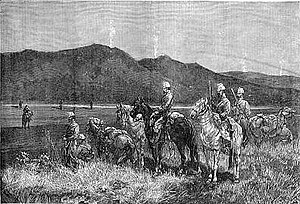French occupation of Tunisia
| French conquest of Tunisia | |||||||
|---|---|---|---|---|---|---|---|
| Part of the French colonial wars | |||||||
 French Chasseurs d'Afrique on outpost in Tunis, 1881.  Tunisian uniforms in 1881. |
|||||||
|
|||||||
| Belligerents | |||||||
|
|
|
||||||
| Commanders and leaders | |||||||
| Jules Aimé Bréart | Sadok Bey | ||||||
| Strength | |||||||
| 28,000 men 13 warships |
|||||||
The French conquest of Tunisia occurred in two phases in 1881: the first (28 April – 12 May) consisting of the invasion and securing of the country before the signing of a treaty of protection, and the second (10 June – 28 October) consisting of the suppression of a rebellion. The French protectorate of Tunisia that was established lasted until the independence of Tunisia on 20 March 1956.
Tunisia had been a province of the Ottoman Empire since the Conquest of Tunis (1574), although with great autonomy under the authority of a Bey. In 1770, Admiral De Broves for Louis XV bombarded the cities of Bizerte, Porto Farina and Monastir in retaliation for acts of piracy. In the 19th century Tunisian commercial contacts with Europe were numerous, and there was a population of French, Italian and British expatriates in the country, represented by Consulates. France had also made a major loan to Tunisia in the mid-19th century. The Tunisian government was weak, with an inefficient tax system that only brought it one-fifth of the tax collected. The economy was crippled with a series of droughts and the elimination of corsairs by Western fleets. Lastly, Tunisians had little control on foreign trade as ancient 16th century agreements with European powers limited custom taxes to 3%. As a result, its small industry was devastated by imports, especially in the area of textiles.
Following the Franco-Prussian War of 1870–71, France's international prestige was severely damaged, and both Italy and the United Kingdom attempted to reinforce their influence in Tunisia. The Italian representative failed through clumsiness, but the British representative Richard Wood was more successful. In order to limit French influence, Wood obtained the reinstatement of Tunisia as a province of the Ottoman Empire in 1871, although autonomy was guaranteed at the same time. Great Britain continued to try to exert influence through commercial ventures; these were not successful, however. There were also various Tunisian land ownership disputes among France, Britain and Italy.
...
Wikipedia
